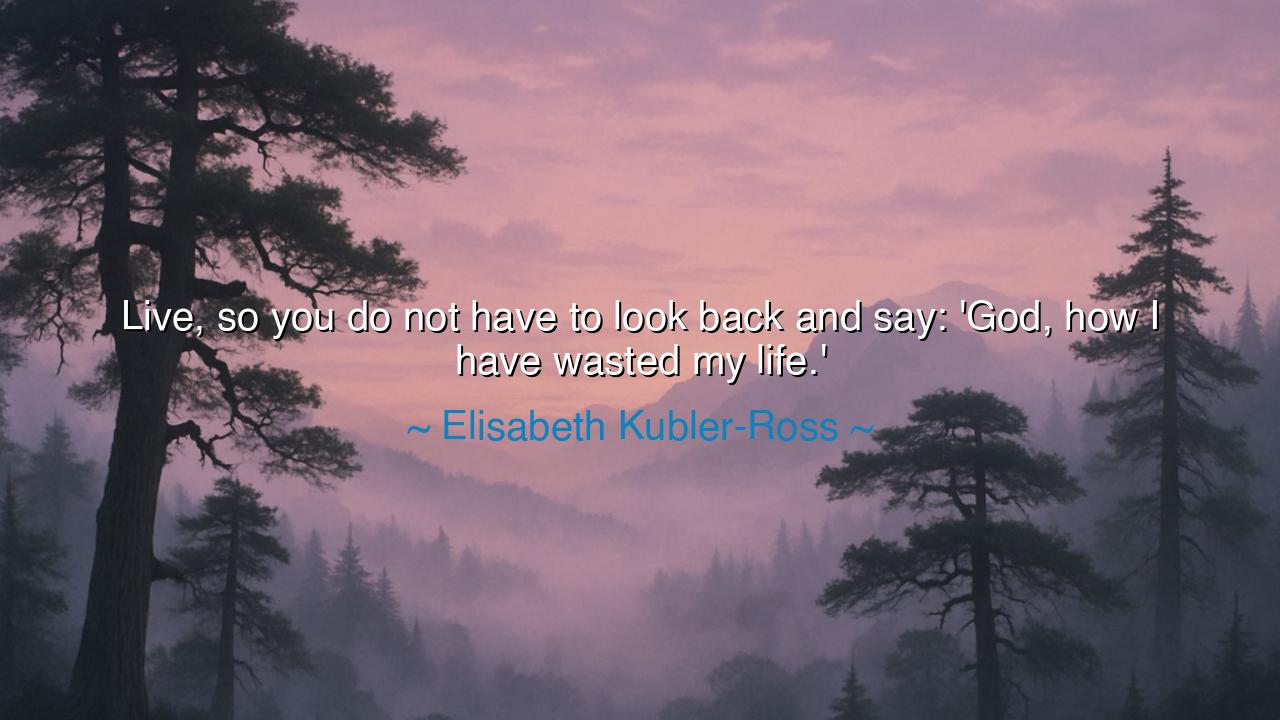
Live, so you do not have to look back and say: 'God, how I have






"Live, so you do not have to look back and say: 'God, how I have wasted my life.'" – Elisabeth Kübler-Ross.
In this powerful statement, Elisabeth Kübler-Ross compels us to confront the reality of life's fleeting nature and the profound responsibility we have to make it meaningful. She urges us not to let the days pass in complacency, avoiding the regret that arises when one realizes that they have not fully engaged with life, nor pursued what truly matters. To live without purpose, to drift through the hours without passion, is to waste the precious gift of existence. Kübler-Ross speaks not merely of surviving life, but of living it with intention—so that when we look back, we can do so with a sense of fulfillment, not with the despair of missed opportunities.
The ancients were keenly aware of the brevity of life and the importance of living it with purpose. Socrates, the great Greek philosopher, famously said, "The unexamined life is not worth living." He believed that to live well required deep self-reflection, an ongoing search for truth, and a commitment to living with virtue. The notion of a life well-lived was central to ancient philosophy, where the focus was on achieving eudaimonia—a term Aristotle used to describe the flourishing of human beings through righteous living, self-discovery, and thoughtful engagement with the world. For Socrates, the ultimate tragedy was not death, but a life lived without purpose and self-examination.
Similarly, the Roman Stoics, such as Marcus Aurelius and Epictetus, understood that life is constantly in motion, and our true work is to live in alignment with our highest principles. Marcus Aurelius wrote in his Meditations, “Waste no more time arguing about what a good man should be. Be one.” His exhortation is a call to action, reminding us that life’s meaning is not found in idle speculation, but in how we live each moment, how we meet the world with integrity, courage, and grace. To look back and feel that we have wasted our time is to fail in the mission of our existence—to live a life of purpose and virtue.
Consider the life of Vincent van Gogh, whose tragic yet deeply purposeful existence exemplifies this call to live fully. Van Gogh's work was not celebrated during his lifetime, yet he poured every ounce of his being into his art. In his letters, he often expressed his deep passion for painting and the desire to capture the beauty he saw in the world. Van Gogh struggled with mental health, poverty, and a sense of being misunderstood, but he continued to create with the belief that his life had meaning. In retrospect, his dedication to his craft and his intensity are what make his work timeless. Van Gogh’s life, though marked by suffering, was not wasted—it was a commitment to his vision and to expressing his truth, despite the pain. His legacy shows us that living authentically, even in the face of hardship, means fulfilling one's potential and purpose, and avoiding the regret of an unexamined life.
Another example can be found in Mahatma Gandhi, whose life is the epitome of living with purpose and conviction. Gandhi’s commitment to nonviolence and freedom for the people of India was not just an ideological stance—it was a deep, personal mission that shaped every decision he made. Despite enduring imprisonment and personal sacrifice, Gandhi never wavered from his path. His life was not without its difficulties, yet he lived fully, driven by a clear sense of purpose to serve others and to lead India toward independence. His legacy is a testimony to how a life of service and dedication can transcend hardship and leave a mark of profound meaning on the world.
Kübler-Ross’s insight is a call to embrace the present moment, to engage deeply with the world around us, and to pursue what truly matters. Life is not simply about existence—it is about making the most of the time we have. Whether through our relationships, our work, or our personal growth, the key to a fulfilling life lies in our ability to live intentionally, to act in line with our deepest values, and to avoid the trap of regret. To live fully means to take responsibility for the time we are given, to use it wisely, and to ensure that when we look back, we do not say, "How I have wasted my life," but rather, "I have lived with purpose."
The lesson here is one of intentionality and purposeful living. Every day is an opportunity to align ourselves with our deepest values, to engage with the world with compassion, and to pursue what matters most. We must ask ourselves: What do I want to achieve? What legacy do I want to leave? The answer to these questions can guide us as we live our lives with clarity and focus, ensuring that we do not waste the precious time we are given. Let us commit to living authentically, to taking action on our dreams and responsibilities, and to being fully present in the lives of those around us, knowing that in doing so, we will create lives filled with purpose, meaning, and fulfillment.






AAdministratorAdministrator
Welcome, honored guests. Please leave a comment, we will respond soon